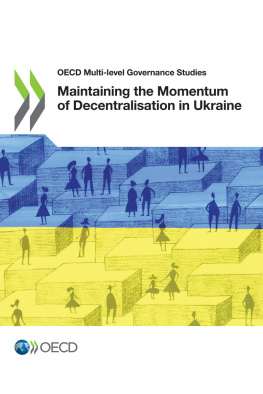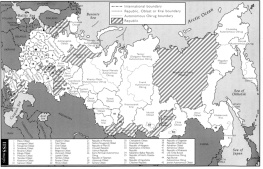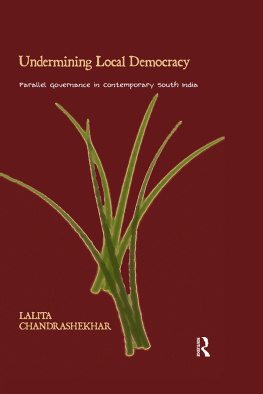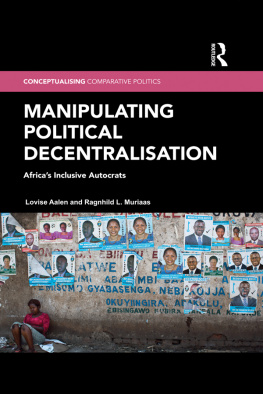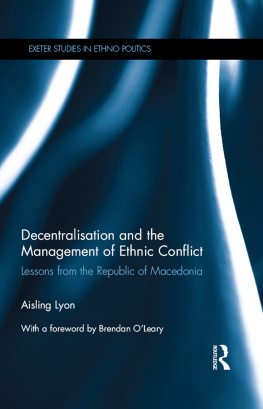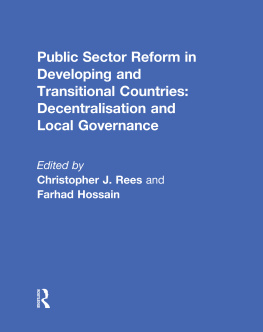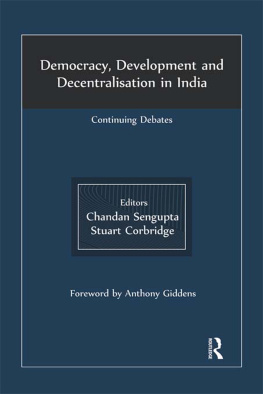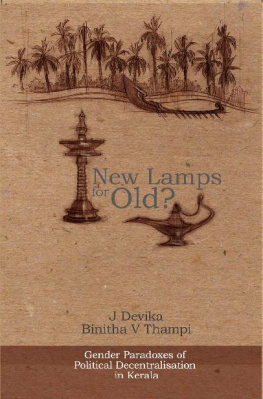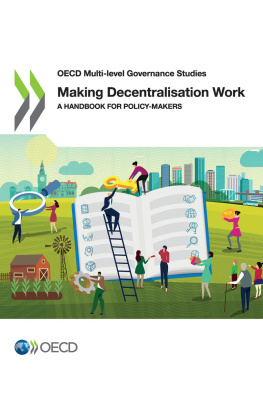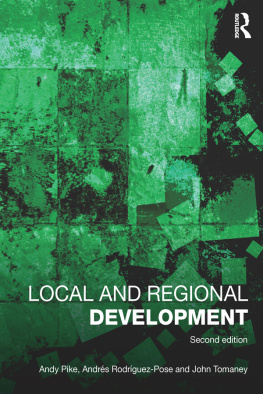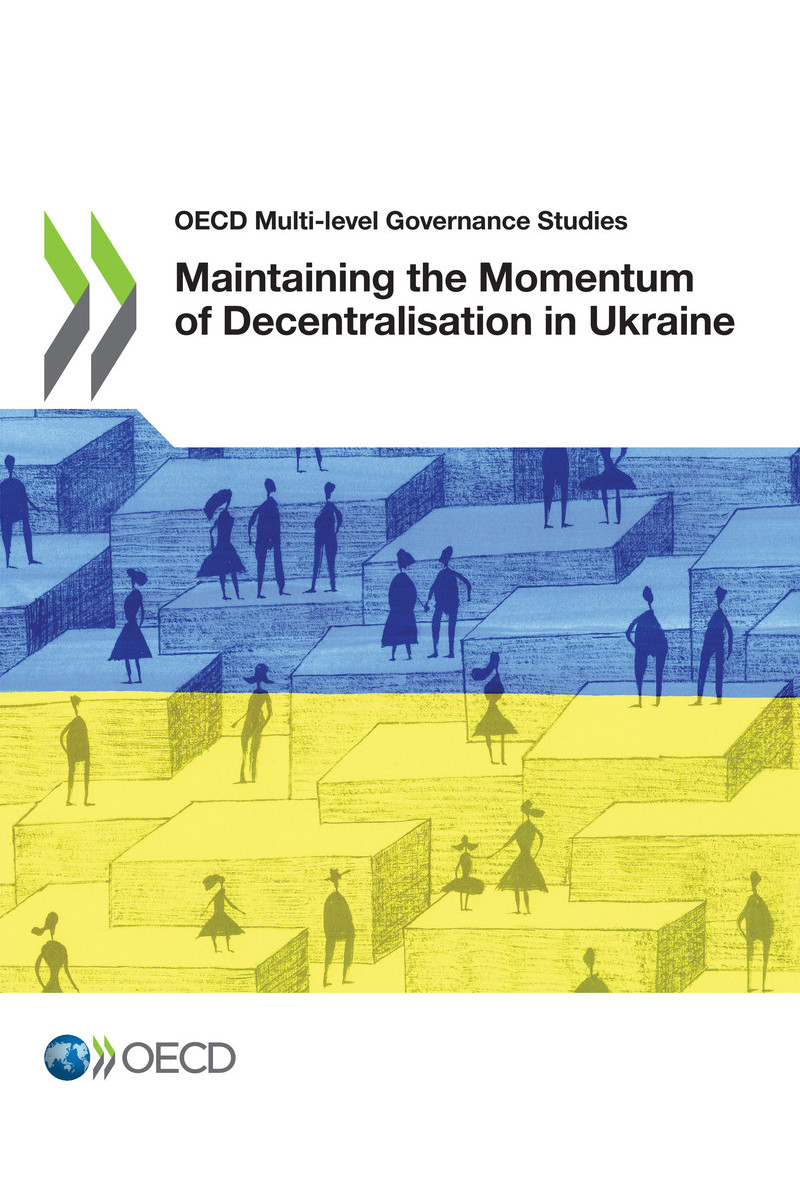OECD Multi-level Governance Studies
Maintaining the Momentum of Decentralisation in Ukraine
Please cite this publication as:
OECD (2018), Maintaining the Momentum of Decentralisation in Ukraine , OECD Multi-level Governance Studies, OECD Publishing, Paris.
http://dx.doi.org/10.1787/9789264301436-en
Metadata, Legal and Rights
ISBN: 978-92-64-30138-2 (print) - 978-92-64-30143-6 (pdf) - 978-92-64-30158-0 (HTML) - 978-92-64-30157-3 (epub)
DOI: http://dx.doi.org/10.1787/9789264301436-en
Series: OECD Multi-level Governance Studies
ISSN: 2414-6781 (print) - 2414-679X (online)
This work is published under the responsibility of the Secretary-General of the OECD. The opinions expressed and arguments employed herein do not necessarily reflect the official views of OECD member countries.
This document, as well as any data and any map included herein, are without prejudice to the status of or sovereignty over any territory, to the delimitation of international frontiers and boundaries and to the name of any territory, city or area.
The statistical data for Israel are supplied by and under the responsibility of the relevant Israeli authorities. The use of such data by the OECD is without prejudice to the status of the Golan Heights, East Jerusalem and Israeli settlements in the West Bank under the terms of international law.
Photo credits: Cover Illustration Jeffrey Fisher.
Corrigenda to OECD publications may be found on line at: www.oecd.org/publishing/corrigenda .
OECD 2018
You can copy, download or print OECD content for your own use, and you can include excerpts from OECD publications, databases and multimedia products in your own documents, presentations, blogs, websites and teaching materials, provided that suitable acknowledgement of OECD as source and copyright owner is given. All requests for public or commercial use and translation rights should be submitted to .
Foreword
Beginning in 2014, the Ukrainian government embarked on an overhaul of its multi-level and territorial governance structures, including through decentralisation reform. For decentralisation to work effectively, a simple transfer of responsibilities to lower levels of government is not enough. A number of other conditions must be met, starting with the sufficient and appropriate resources to fulfil new responsibilities. Resources need to be complemented by adequate capacities at the subnational level, proper co-ordination mechanisms, effective monitoring systems and a good balance in the way various policy functions are decentralised.
The Ukrainian government and its Ministry of Regional Development, Construction and Utilities requested the OECD to support the successful implementation of decentralisation reform by following up on the OECD Territorial Review of Ukraine conducted in 2013. The current work is undertaken as part of the OECD's three-pillar Action Plan for Ukraine, signed in April 2015. The Action Plan covers three pillars: i) anti-corruption; ii) governance and rule of law; and iii) investment and business climate. The second pillar on governance issues includes, among other areas, support to the decentralisation reform agenda.
This report updates and extends the OECDs prior regional economic analysis of Ukraine with development trends since the Donbas conflict, offers insight into Ukraines territorial and decentralisation reform agenda, and explores the impact of fiscal decentralisation. The reports analysis of the structure and implementation of Ukraines multi-level governance and decentralisation reform highlights successes, identifies areas for additional improvement, and offers recommendations for short, medium and long-term action.
The work has been undertaken as part of the programme of work of the OECDs Regional Development Policy Committee (RDPC), a leading international forum in the fields of regional, urban, and rural development policy and in multi-level governance, and served by the Centre for Entrepreneurship, SMEs, Regions and Cities. It is the result of a partnership with the OECD Global Relations Secretariats Eurasia Division.
The RDPC has long advocated for recognising the importance of multi-level governance and place-based approaches tailored to local and regional needs. To support the RDPC's leadership in this area, the OECD created the Multi-Level Governance Studies series in 2016. This report dedicated to Ukraine and its reform experience contributes to the body of knowledge contained in this series.
This report was discussed at the RDPCs 38th Session on 8 December 2017 and was approved on 15 January 2018.
Acknowledgements
This report was produced by the Centre for Entrepreneurship, SMEs, Regions and Cities (CFE) of the OECD led by Lamia Kamal-Chaoui, Director, in partnership with the Global Relations Secretariat of the OECD, led by Andreas Schaal.
The project was implemented in the context of the OECD-Ukraine Memorandum of Understanding. It was made possible thanks to the financial contribution of the European Union Delegation to Ukraine and the Governments of the Czech Republic, Flanders (Belgium) and the Republic of Poland.
The report was coordinated and edited by Maria-Varinia Michalun, Policy Analyst, under the supervision of Dorothe Allain-Dupr, Head of the Unit for Decentralisation, Public Investment and Subnational Finance in the Economics, Statistics and Multi-level Governance Section of CFE. Chapter 1 was written by Antoine Comps and Jibran Punthakey. Chapter 2 was written by Maria-Varinia Michalun. Chapter 3 was written by Isabelle Chatry. Chapter 4 was drafted by Jibran Punthakey with input from Antoine Comps. The report benefited from significant contributions from Jrn Grvingholt, Senior Researcher, German Development Institute/Deutsche Institut fr Entwicklungspolitik (DIE) for Chapter 2 and Rosario Macario, Professor, CERIS, Insituto Superior Tcnico, Universidade de Lisboa, Portugal for Chapter 4. Valuable research and translation was provided by Lyudmyla Tautyeva, and equally valuable comments, input and support on the report and report process were received from Luke Mackle, Gabriela Miranda, Joaquim Oliveira Martins and William Tompson (OECD). In Ukraine, operational, logistical and administrative support was provided by Mykhailo Semchuk, and interpretation and translation provided by Liudmilla Taranina.
The OECD would like to thank the Ukrainian authorities at the national and subnational levels for their co-operation and support during the review process. Special thanks are due to Mr. Hennadiy Zubko, Vice Prime Minister and Minister of Regional Development, Construction, Housing and Communal Services, for his commitment to the project, and to the First Vice-Minister of Regional Development, Construction, Housing, and Communal Services, Mr. Vyacheslav Nehoda, and his team, for their collaboration. Thanks are also due to representatives of the Ministry of Finance, Ministry of Infrastructure, Ministry of Ecology, Cabinet of Ministers, the State Statistics Service of Ukraine (SSSU), the Verkhovna Rada of Ukraine, and the Presidential Administration of Ukraine for accepting to meet with the OECD team and share valuable information during the missions. Special thanks go to the representatives of the Association of Ukrainian Cities, the Association of Amalgamated Territorial Communities, and the Ukrainian Association of Rayon and Oblast Councils for their participation in the seminars and the study visits, and for their support in hosting OECD seminar.

